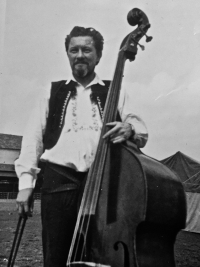Father said: What did you expect, you are my son
Stáhnout obrázek
Jan Vančura, musician, folklorist and long-time member of the Hradišťan dulcimer band, was born the eldest of three sons on 13 August 1926 in Uherské Hradiště to parents Františka and Jan Vančura. His father served as a legionary on the Eastern Front during the First World War. During the Second World War, he joined the resistance group Obrana Národa (Defence of the Nation). Later, he managed to escape and joined the Czechoslovak foreign army and took part in the defence of Tobruk. František‘s mother was imprisoned for a year in an internment camp in Svatobořice. Jan and his brothers were cared for by relatives, and he also lived in Prague. In his youth, he worked in the Slovácko Philharmonic Orchestra, where he played the viola, and as a teacher in music schools. He worked as a manager at the House of Enlightenment in Uherské Hradiště and later at the national company Mesit as a publicity officer. In the 1950s, he became a member of the Hradišťan dulcimer music group led by Jaroslav Staněk. At the beginning of the 1970s, he was banned from public performances with this ensemble. The reason was disagreement with the invasion of Czechoslovakia in 1968. Until today (2023), he is still a member of the ensemble Hudci pondělníci and lives in Staré Město.

